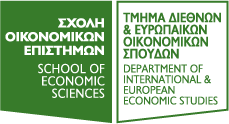Macroeconomic Policies of the EU
Number of credits allocated: 6 ECTS Credits
Objective of the course
Upon completion of the course, students will be able to use tools of macroeconomic s and international macroeconomics in order to analyze issues of EU fiscal and monetary policy and to increase their understanding of these issues (including recent developments in the fiscal framework and economic governance at the macroeconomic level). Given the importance of these policies, the in depth study of EU monetary and fiscal policy is essential for European Studies.
Prerequisites: ---
Course contents
The European Monetary System: Benefits from ERM participation. The success and failure of ERM I. The new Member States and ERM II. Theory of Optimum Currency Areas. Costs and benefits of Monetary Union. Monetary integration in the EU the economic intuition behind the criteria for joining the euro area. Monetary convergence of the new Member States. Monetary policy in the third stage of EMU. Transmission mechanism of monetary policy in the euro area. Inflation divergence in the euro area. The euro area in the context of the world economy. The role of the euro in the world economy. The impact of Monetary Union on fiscal policy. Fiscal policy in the EU and the Stability and Growth Pact. Fiscal cooperation and fiscal union.
Recommended reading
- Μαργαρίτα Κατσίμη, «Μακροοικονομικές Πολιτικές της Ευρωπαϊκής Ένωσης», Εκδόσεις Οικονομικό Πανεπιστήμιο Αθηνών, 2016.
- Paul de Grauwe, “The Economics of Monetary Union”, Oxford University Press, 2014.
Teaching methods
Lectures and tutorials.
Assessment methods
Final written exam (100%) or final written exam (70%) and presentation (30%).
Language of instruction: Greek





